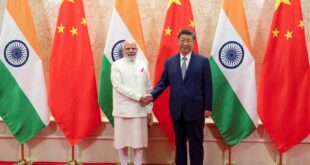By Stana Dubajic •
After downing of the Russian SU-24 fighter-jet over Syrian airspace for an alleged ‘Turkish airspace violation’, the US probably expected Russia to retaliate militarily, which would then ‘justify’ deeper military involvement of US-UK-NATO alliance in the Syrian-Iraqi battlefield.
Since Russia and Iran would not let go easily of their roles in the region, neither would they allow the terrorist spillover into their own backyards, the fighting that would ensue following deeper military involvement of Western-Turkish alliance, would then cause a region-wide military conflict.
For the reasonable among the parties involved in the Middle East regional war-peace game, the Russians seem fully aware of the global consequences of such a move and have decided to act opposite to what the US expected them to do. They have intensified the airstrikes on the terrorist groups in Syria, while at the same time waging a full-fledged diplomatic battle negotiating with every conceivable party with overt or covert interests in the Syrian conflict.
Western Scheming and Turkey’s Future
One of the available options (and preferred by West) would be a wider military conflict in the region, something that can be seen from the various statements of some leading American policy makers and influential political figures. Such regional conflict, would ideally take years, and is often labeled a “30-year war” scenario for the Middle East, according to Stratfor’s George Friedman and the like, while the Plan B is based on regional coalitions that are expected to play a role similar to that played by the Arab army under Sharif Hussein in the ousting of the Ottomans from the Arabian lands, in the course of the WWI.
Behind both scenarios is one key common theme – arms sales and perpetual chaos and instability, to enable control over natural resources from the region’s energy rich countries.
If plan A does not work, due to powerful opponents in Syria (Russia, Iran, Syria and “crouching tiger” of China) there is a plan B. As the mastery of the regional seas and choke points (Mediterranean, Black Sea, Persian Gulf, the Red Sea, Hormuz and Bab el Mandeb) is shifting due to geopolitical and economic changes Plan B includes using Turkey as a proverbial sacrificial lamb. This is a similar strategy that was previously used by the West in various regions and with various former allies (Iraqi Saddam Hussein, Egyptian Hosni Mubarak, and Libyan Gaddafi among others).
Turkey is not acting alone or on a whim in neither Syria, nor Iraq. America is fully complicit in the Turkish game in the Middle East, and it was fully aware from the very beginning of what is going on in Syria and the region. Global public believes the problem in Syria started with the peaceful ‘Arab Spring’ that turned into armed conflict to overthrow the legitimate, secular, modern Arab Syrian government, led by Bashar Al-Assad. However, Syria is just another in the chain of Middle Eastern regimes set for overthrow in the game of remapping the Middle East for the 21st Century (as set by the American neocons).
Turkey Plan A: Internal political issues
The Western scheming with Syria was drastically altered by Russian and Iranian involvement in the conflict, leading to the deployment of an alternative plan B.
Plan B means that Turkey (Qatar and Saudi Arabia) will be dragged deep into the conflict, sold arms, sold the idea of sending mercenaries and even troops, to prolong the conflict to the ‘last Arab and Turk’ willing to die for the megalomaniac ideas of their leaders.
Due to strong and capable armies on the other side, this is very unlikely to lead to victory for the Western allies soon-victims, but will most likely lead to internal struggles and final dissolution of these countries – as a consequence of weakened economies and failed military interventions aimed to prop them as regional leaders.
- Turkey’s Kurdish Question
Until recently with Erdogan’s politics of Kurdish repression they were pretty much under control except for the occasional bombing of Syrian and Iraqi Kurds. The shooting of the Kurdish lawyer last week – has put the old Kurdish-Turkish internal issues back on top of the agenda. And these issues are going to be one of the key factors of internal disintegration of Turkey in the near future.
How soon and how intense the internal conflict (possibly a civil war) will be is highly influenced by the moves of external players in the Middle East-Turkey arena. This matter is still largely ignored from the Western media, as the goal of the Western political elite is to give Turkey an impression that they are fully backed by their “allies”. Once the Turkey becomes aware of this, it will be a cold turkey.
- Government –Mafia Marriage and the Illicit Business Offspring
As more evidence of Turkish government officials’ involvement in the Daesh oil and other illicit trade is being made public, including evidence provided by the Russian government, Turkish links with the terrorists operating in Syria, as well as its political elite involvement in diverse types of criminal dealings, including smuggling of refugees and the like, the international opinion on Turkey as a reliable ally in the Middle East is drastically eroding overnight. This implies that the key ally – the US – has, for some reason, decided to turn its back on Erdogan, and to literally get rid of him by watching him make blatant political and military errors, both at home and in the Syrian and Iraqi neighborhoods, essentially leading him to a political suicide.
The tactic of letting Erdogan go could be caused by two major reasons. One is, that the US is realizing that it cannot keep its presence in the Middle East because it is overstretched economically and militarily, trying to keep few apples in too many baskets, while Russia is growing in importance as a reliable partner in the Middle East. China is silently nodding in approval, while some Arab leaders seem to be starting to understand this.
Although the US myopically sees the Middle East as represented by the respective countries’ governments, the peoples’ (unspoken) opinion, as well as the tribal and other traditional links and hierarchies in these societies cannot and should not be overlooked, and least of all, underestimated.
As much as the West may want the Arabs to modernize, the tribalism still rules supreme across most of Arab states. The destruction of Iraq, the ‘Arab Spring’ across Levant, and Maghreb (including the Libyan disaster) have shown the Arabs what can happen to the American allies once the economic and other interests change in the White House and elsewhere in the American ruling establishment.
The other reason for this could be that, using Turkey as a tool to achieve as much of its geopolitical and economic interests in the Middle East (Syria and Iraq in particular), the US will try to sow as much chaos as possible, so that it keeps its foot on the ground even if it is militarily not directly engaged. The recent announcement of US to pull out the Patriot anti-missile system from Turkey is another proof that US is reconsidering its role in the Middle East.
While the tactics it employs will surely change to using various proxies and other means, sacrifice of the present day allies is the last card that Western powers will play, when the push comes to shove. In the Machiavellian manner, goals justify the means, now as ever.
- Economic Pressures Caused by Russian Sanctions
Looking solely at the statistics of how little or great the percentage of non-energy trade of Turkey with Russia is – Turkish agriculture, textile, tourism and construction provide livelihoods for many people in Turkey. Once this lifeline has been severed, due to recently imposed economic sanctions by Russia specifically affecting these areas, the discontent of many of the Turks will come to haunt Erdogan and his clique, eventually leading to his demise.
Military and security apparatus may under pressure succumb to peoples’ demands and Turkey may live to witness the Egyptian scenario, where the secular Mubarak’s regime was replaced by the Islamist-Salafist Morsi, who under popular pressure was toppled by the military coup d’etat led by Abdel Fattah Al Sisi.
Turkey Plan B: External Issues
- Arab Neighbours’ Ottoman Nightmares and Erdogan’s Neo-Ottoman Dreams
What is not often mentioned much in public discourse, or at least not in the mainstream media, is that majority of Arab states in the Levant in particular, and some in the Gulf too, are not very happy with the Turkish-Saudi-Qatari triad plans for the reframing of the Middle East. For those in the know, it revokes the memories of the Ottoman yoke which 100 years ago ended by the Arab rebellion under Sharif Hussein, and the final expulsion of the Turks from Arab lands.
One more important point is that at the same time when the Arabs under the leadership of the Hashemites have successfully defeated Turks in the hopes of getting the independence in return, their then allies, Britain and France cheated them out of the lands they paid for in blood. Today, it seems that Turkey is being used or is using its alliance with US and NATO at the expense of its Arab neighbors. The echo of this feeling was the recent message of Iraqi PM who expressed the public and official Iraqi stance against US troops on the ground to fight Daesh/ISIS. The key part of the Iraqi PM’s message, perhaps being, that the US troops are seen as occupiers and as such are not wanted.
Other Arabs, with the exception of Syria, are not yet voicing their opinions about Turkish appetites in the Levant, but it is likely that the opposition to Turkey will soon became more widespread across the Arab world. Especially if more evidence on Turkish involvement in illicit trade with the terrorist ‘Islamic State’ grows, or that such trade disrupts their own economic and national security interests.
This illicit business involvement can play against Turkey in the international political community arena as well, in shaping a different public opinion in the West about Turkey as a NATO member, and a partner in fighting terrorism, while it is actually an active sponsor and exporter of terrorism.
- Balkans’ Connection – the re-Radicalization of the Muslims
During the breakup of Yugoslavia Saudi Arabia and Turkey were openly supporting and lobbying for the Bosnian Muslims in the bloody civil war. Until today majority in the Western as well as the Muslim world believe that the conflict in Yugoslavia was about the ‘genocidal intent of Serbs’ to exterminate the Bosnian Muslims. What is missing in this narrative is the historical framework, which shows that ethnically Bosnian Muslims are Serbs, separated from Bosnian Orthodox Serbs by religion only. During the 400 years under Ottoman rule many people converted either under pressure, or for economic benefits. The link of Bosnian Muslims with Turkey is based on religious affiliations, while the language, culture and even blood ties link them to their Orthodox ancestors and present neighbors. This is also evident in family names such as Filipovic, which clearly indicates descendancy from a Christian – Filip.
The role of Turkey (and Saudi Arabia) in the Yugoslav conflict is still greatly controversial, and mostly unknown to wider public. Both countries are responsible for the import of jihadists into Bosnia during the 1990s civil war and the radicalization of the moderate and mostly secular Bosnian Muslim communities during the war. The similar situation that was supported and funded by Turkey and Saudi Arabia can be found in Kosovo with the Albanian separatists and terrorist groups.
Turkish active attempt to re-establish ties with former colonies, in the heart of Balkans, can be seen in the past 5 years at least, with its funding of various NGOs promoting closer ties with Turkey, imposing stricter version of Islam including bringing back the traditional veiling of women.
This, however, seems the lesser of a problem as Turkey, as well as the entire Balkans, is a major transit route linking Asia and Africa with Europe, as seen these days in the transfer of immigrants from these two continents into Europe.
During the economic embargo placed on Serbia in the 1990s Turkey was a key supplier of various goods and the major black market trade-hub. During economic crisis caused by civil war and international embargo, very strong black market economy has developed both in Serbia and in Bosnia-Herzegovina, the latter having a great Muslim population, hence being religiously tied to Turkey. Some of the war lords became very rich and powerful as a result of sanctions, as well as connected into what has become known as the “Balkans’ mafia”.
These ties in states like Bosnia, Serbia, Kosovo* and Montenegro are deeply entrenched into the highest echelons of all governments since the Yugoslavian break up. Extremist factions and former jihadist fighters still have close ties and protection from the Muslim political elites in Bosnia-Herzegovina, and several are known to be operating ever since the end of the Bosnian war in 1995.
The distinction between the terrorist groups and the criminals belonging to the Balkans’ mafias is blurred across the region, but the linkages between some regional governments and these groups are much more than just a conspiracy theory.
US-NATO and Turkey as a (Greedy) Proxy
Due to the interconnectedness of all these various factors, the current situation in the Balkans seems to indicate the following scenarios for the future:
Kosovo opposition demonstrations coinciding with the gathering of the ISIS fighters in the center of Priština are aimed at the same goal: to incite crisis in the southern Serbian province* as Serbia is balancing between EU accession talks and closer ties with Russia and Eurasian Economic Union.
NATO invitation to Montenegro seems a blatant provocation alike the Turkish downing of SU-24 in Syria – extended to a de facto mafia state in the midst of popular uprising against both the NATO and the last European dictator, currently PM, Milo Djukanovic. For some reason he does not bother the West as undemocratic tyrant, despite being in power for over 20 years. Montenegro is a country of about 650,000 people and geo-strategically insignificant for the NATO. However, its eventual accession to NATO would be affecting Serbia who keeps claiming it wants to remain militarily neutral, whereby the IPAP Agreement signed with NATO makes it de facto NATO ally despite not being a member. This is evident in the fact that over the past decade Serbia has undertaken serious reframing of its military system according to NATO advice. The NATO advisors have their seat in the building of Serbian Defense Ministry.
In this light, the NATO invite to Montenegro can only be understood as approaching and encircling Russia, because having Montenegro in NATO does not make any sense militarily. It only serves to send a message to Russia that the Balkans are out of its sphere of influence.
Russia has expressed its displeasure about this move but is not likely to react aggressively as is expected by the West. Russian leadership seems to be playing the waiting game and keeping its cards close to the chest.
The problem is that both in Serbia and Montenegro, as well as Republic of Srpska (Serbian part of B-H Federation), the people are strongly opposed to NATO and strongly supportive of closer ties with Russia and Eurasian Union. If the pushing from US-EU-NATO continues in the direction of distancing Serbs from Russia the most likely outcome is internal conflict.
Is this what the West needs and hopes for, if the plan to kick Russia out of the Middle East and the Balkans? It depends on the perspective. The pressure and problems in both the US and the EU are increasing. Refugees from the Middle East are adding to the existing burden. The staunchest supporters of the EU – the Germans, seem divided over further sanctions against Russia, and on the Middle East war-peace issues there are also multiple divisions. Italy is quiet.
The West has a trump card in the Balkans – the Albanians. They have played the role of allies to Ottoman Turks, and to the Nazis. They have been assisted by the US-NATO-EU in their quest for independence from Serbia, but have recently been openly critised by their powerful protectors, especially for the lack of progress on the issue of the Special Tribunal for War Crimes, which include some of the leading government figures, such as the current FM, Hashim Thaci.
All this seems like either a lack of clear direction on the side of US, or just a final desperate attempt of the party that understands it has lost the war in the region (both Balkans and the Middle East), but just for the sake of malice (and profit, of course) will make the last dirty move – at the expense of others, naturally. To make it a notch harder for the Russians, or whoever comes to prominence once they are out of the game.
Hopefully this time the civil war in the parts of former Yugoslavia will not happen, although the tensions are high and there is a constant adding of oil to the fire via various channels, ranging from media to governmental and non-governmental figures. People are for now mostly noisy on the social media. The approaching winter might prevent them from taking to the streets at least till March. When they do however, it hopefully won’t lead to yet another bloody spring!
Stana Dubajic is a geopolitical researcher and analyst, based in the Middle East and the Balkans
 Geostrategic Media Political Commentary, Analysis, Security, Defense
Geostrategic Media Political Commentary, Analysis, Security, Defense





